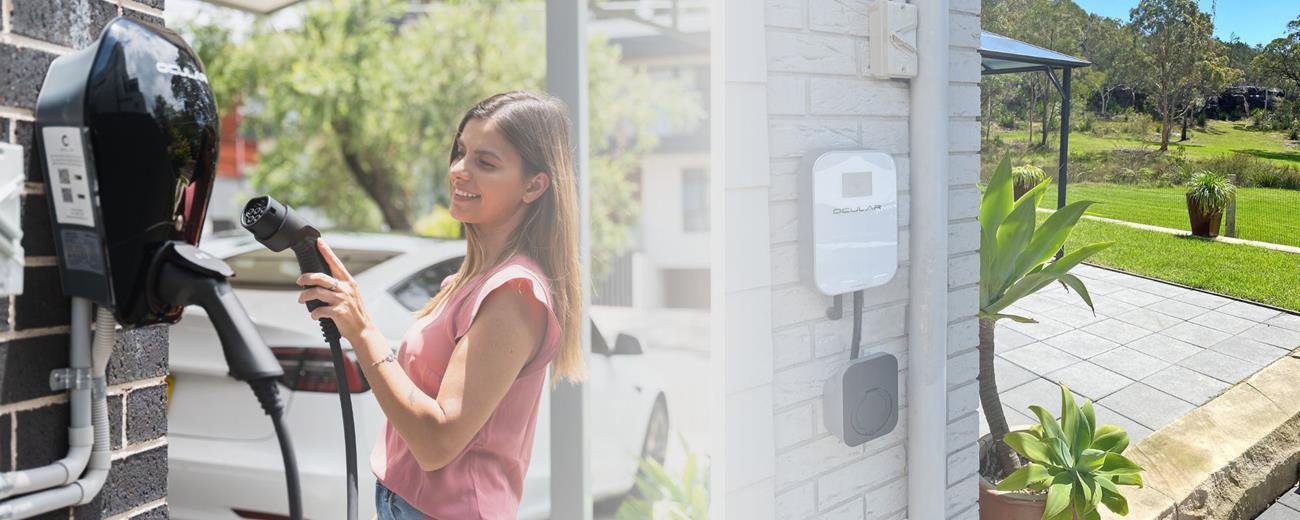Which Electric Vehicle Charger should you install at your house?

“Which Electric Vehicle (EV) Charger is best to install in my home?” This is a question we are frequently asked by new EV drivers and those considering the swap to an EV. In this blog, we’ll explore the different types of EV chargers, their benefits, and key factors to consider when making your choice.
Charging Basics
It is important to first understand the different types of EV chargers before looking into which charger is best to install in your home. There are two forms of EV chargers, AC (alternate current) or DC (direct current). AC charging is used mostly in the home or at small public charging stations, it uses the EV’s onboard charger to convert AC to DC, making it a slower charging option and most suitable for overnight charging / long charging. While DC charging is found most along motorways or fast charging stations it bypasses the process of converting AC to DC and directly supplies DC power to the battery. This is a much faster form of charging but is more expensive.
1) What EV are you looking to charge?
This is the most important question to answer as the EV you drive will determine which charger is most suitable. Currently, all EVs use a Type 2 (Mennekes) plug and can use any charger. At home, most people will generally prefer an EV charger with a cable already attached given its convenience. The Ocular LTE is a great charger and can be purchased with or without the 6m tethered cable. See our Home EV Charger page or more information. Additionally, the EV you drive will determine the EV’s onboard charging capabilities, range and battery capacity, and hence the best power level of charging required. Find your EV range and battery capacity here.
2) What is the availability of power in your house?
Once you have decided if you are going for a portable charger, tethered or universal charger, the next step is to determine what is the availability of the power of your home. Does your home have three-phase power, or is it an older house with only single-phase availability?
For some clients who drive a Plug-In Hybrid Electric Vehicle (PHEV) or a BMW i3, single phase charging is more than enough for them, as this allows them to charge at their car at their maximum charging speed; 7.2kW. For other clients such as Tesla drivers, they often prefer three-phase charging up to 22kW given the ability of EV to charge at faster speeds and the larger battery pack.
EVSE offers a range of EV chargers with either a fixed capacity or the ability to be configured and matched to the home’s power availability. Additionally, these chargers can be integrated with Smart Home Automation systems, Solar Photovoltaic (PV) and Energy Storage systems.
The benefits of solar charging
Solar charging has a range of benefits, combining the advantages of renewable energy with the efficiency and sustainability of electric vehicles. Some of the key benefits include:
- Utilisation of Renewable Energy:
If you currently have solar panels installed, you might want to consider exporting your excess solar energy and using it to charge your EV in an environmentally friendly manner. As solar energy is a renewable and clean source, it promotes sustainability and reduces the reliance on non-renewable resources, such as petroleum oil used to fuel gas cars.
- Financial Benefits:
The upfront cost of installing solar panels and a compatible charging system can be high, although this is offset over time by energy savings. Because solar charging reduces or eliminates the need for grid electricity, it can eventually lead to significant energy cost savings. A great example of a good solar EV charger is our Ocular IQ Solar which can operate as a standard EV charger or use its solar modes to utilise energy generated from your Solar PV. As this unit will work with or without solar it is a great charger to get if you do not currently have solar but plan to add it in the future.
The ideal charger for your home will depend on a number of factors, including your driving habits, demands, and budget. You can make sure that your home charging arrangement is effective and efficient for many years to come by thinking about your future requirements and possible updates. With the right charger, you’ll enjoy the convenience of waking up to a fully charged vehicle every day, ready to take on the road ahead.
Find the right charger for you today!
Have any questions? Contact us:
1300 406 210


